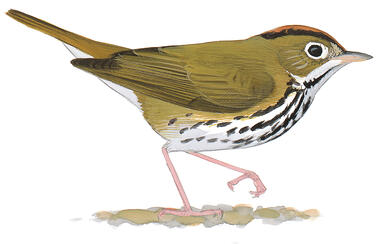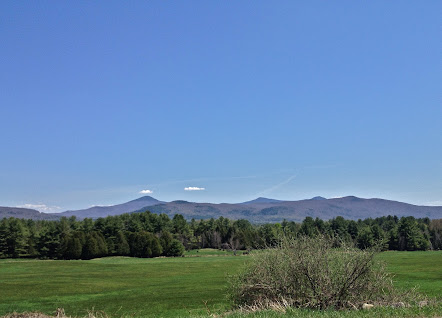P . M . – To Well Meadow .
The summer aspect of the river begins perhaps when
the Utricularia vulgaris is first seen on the surface, as yesterday.
As I go along the
railroad causeway, I see in the cultivated grounds, a lark flashing his
white tail, and showing his handsome yellow breast, with its black crescent
like an Indian locket. For a day or two I have heard the fine seringo note of
the cherry - birds, and seen them flying past, the only ( ? ) birds, methinks,
that I see in small flocks now, except swallows.
The willow down and seeds are blowing over the
causeway.
Veronica scutellata, apparently several days.
A strawberry half turned on the sand of the
causeway side, — the first fruit or berry of the year that I have tasted.
Ladies’-slippers are going to seed. I see some
white oak pincushions, nearly two inches through.
Is that galium, out
apparently some days in the woods by Deep Cut, near Linnæa, triflorum or
Aparine ?. Compare that at Lee ' s.
I should like to know the birds of the woods better, what birds in habit our
woods?
I hear their various
notes ringing through them.
What musicians compose
our wood land quire ? They must be forever strange and interesting to me.
How prominent a place
the vireos hold ! It is probably the yellow - throated vireo I hear now, — a
more interrupted red- ye with its prelia - prelioit or tully - ho,
— invisible in the tops of the trees.
I see the thick, flower - like huckleberry
apples.
Haynes (?), Goodwin ' s
comrade, tells me that he used to catch mud turtles in the ponds behind
Provincetown with a toad on a mackerel hook thrown into the pond and the line
tied to a stump or stake on shore.
Invariably the turtle
when hooked crawled up, following the line to the stake, and was there found
waiting — Goodwin baits minks with muskrats.
Find the great fringed orchis out apparently two or three days.
Two are almost fully out,
two or three only budded.
A large spike of peculiarly delicate pale-purple
flowers growing in the luxuriant and shady swamp is remarkable that this, one
of the fairest of all our flowers, should also be one of the rarest, — for the
most part not seen at all.
I think that no other
but myself in Concord annually finds it.
That so queenly a flower
should annually bloom so rarely and in such : withdrawn and secret places as to
be rarely seen by man ! The village belle never sees this more delicate belle
of the swamp.
How little relation
between our life and its ! Most of us never see it or hear of it.
The seasons go by to us
as if it were not.
A beauty reared in the
shade of a convent, who has never strayed be yond the convent bell.
Only the skunk or owl or other inhabitant of
the swamp beholds it.
In the damp twilight of
the swamp, where it is wet to the feet.
How little anxious to display its attractions
! It does not pine because man does not admire it.
How independent on our race ! It lifts its
delicate spike amid the hellebore and ferns in the deep shade of the swamp.
I am inclined to think of it as a relic of the
past as much as the arrowhead, or the tomahawk I found on the 7th.
Ferns are four or five feet high there.
7 P. M. — Up Assabet.
The tupelo stamens are loose and will perhaps shed pollen to- morrow or next
day.
It is twilight, and the river is covered with
that dusty lint, as was the water next the shore at Walden this afternoon.
Chimney and bank swallows are still hovering
over the river, and cherry-birds fly past.
The veery rings, and the
tree toad.
The air is now pretty
full of shad- flies, and there is an incessant sound made by the fishes leaping
for such as are struggling on the surface ; it sounds like the lapsing of a
swift stream, sucking amid rocks.
The fishes make a
business of thus getting their evening meal, dimpling the river like large
drops as far as I can see, sometimes making a loud plashing.
Meanwhile the
kingfishers are on the lookout for the fishes as they rise, and I saw one dive
in the twilight and go off utter ing his cr-r-ack, cr-r-rack.
The mosquitoes encircle
my head and torment me, and I see a great moth go fluttering over the tree-tops
and the water, black against the sky, like a bat.
The fishes continue to
leap by moonlight.
A full moon.
Covered with disgrace,
this State has sat down coolly to try for their lives the men who attempted to
do its duty for it.
And this is called
justice! They who have shown that they can behave particularly well, — they
alone are put under bonds “for their good behavior !” Such a judge and court
are an impertinence.
Only they are
guiltless who commit the crime of contempt of such a court.
It behooves every
man to see that his influence is on the side of justice, and let the courts
make their own characters.
What is any
political organization worth, when it is in the service of the devil ? I see
that the authorities — the Governor, Mayor, Commissioner, Marshal, etc. — are either weak or unprincipled men, - i.
e. , well disposed but not equal to
the occasion, — or else of dull moral perception, with the unprincipled and
servile in their pay.
All sound moral
sentiment is opposed to them.
I had thought that
the Governor, was in some sense the executive officer of the State ; that it
was his business to see that the laws of the State were executed ; but, when
there is any special use for him, he is useless, permits the laws to go
unexecuted, and is not heard from.
But the worst I
shall say of the Governor is that he was no better than the majority of his
constituents - he was not equal to the occasion.
While the whole
military force of the State, if need be, is at the service of a slaveholder, to
enable him to carry back a slave, not a soldier is offered to save a citizen of
Massachusetts from being kidnapped.
Is this what all
these arms, all this “training,” has been for these seventy-eight years past What is wanted is men of principle, who
recognize a higher law than the decision of the majority.
The marines and the
militia whose bodies were used lately were not men of sense nor of principle;
in a high moral sense they were not men at all.
Justice is sweet and
musical to hear; but injustice is harsh and discordant.
The judge still sits
grinding at his organ, but it yields no music, and we hear only the sound of
the handle.
He believes that all
the music resides in the handle, and the crowd toss him their coppers just the
same as before.

















